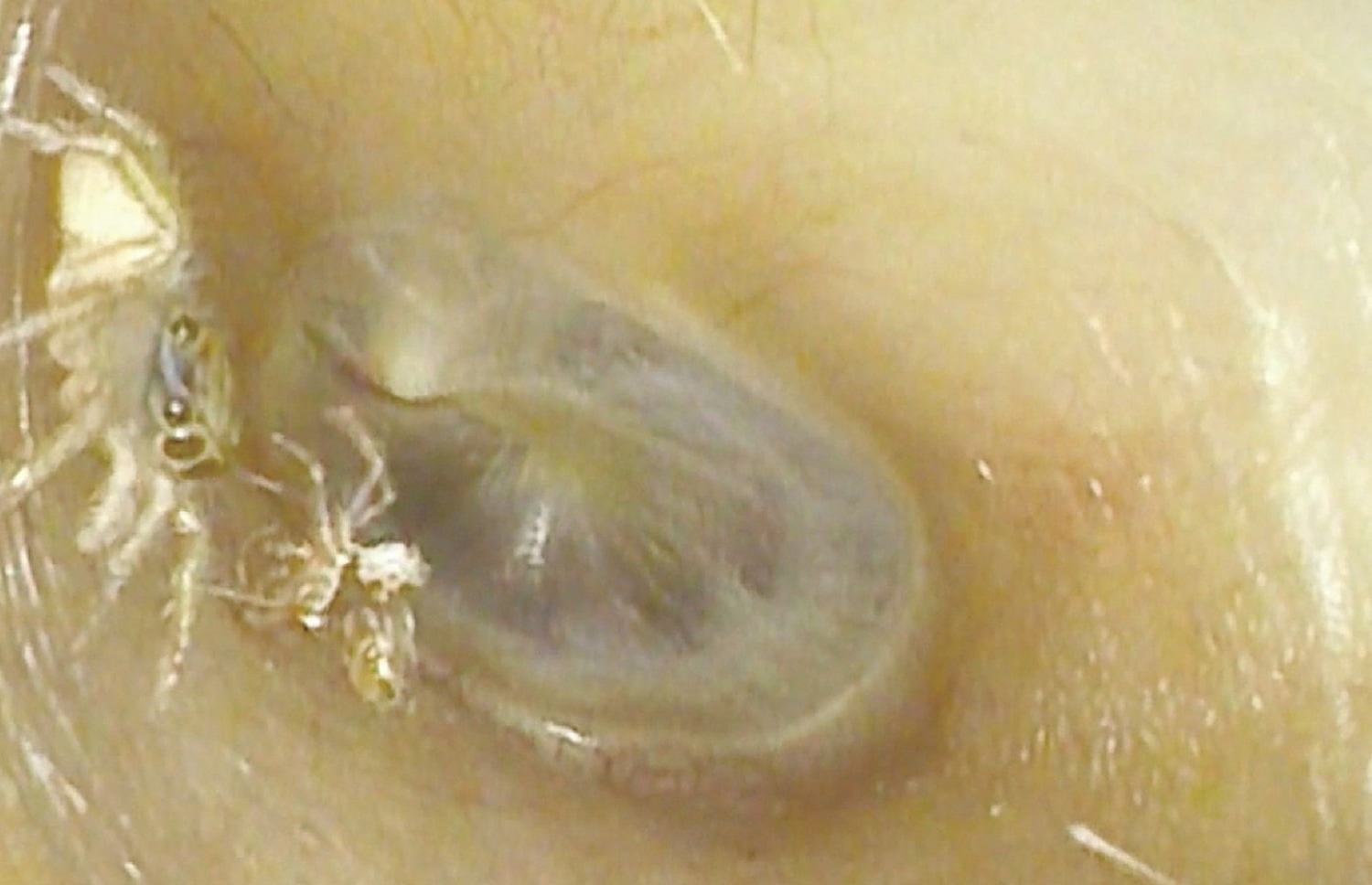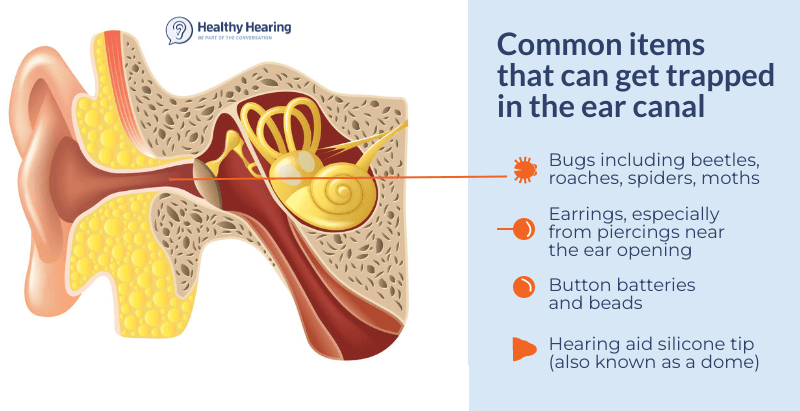If a spider is in your ear, remain calm and seek medical attention immediately. Do not try to remove it yourself.
Discovering a spider in your ear can be an alarming experience. This rare occurrence often triggers panic, but it’s crucial to stay composed. The ear, a sensitive and complex organ, requires professional care in such situations. Prompt medical intervention is essential.
Doctors possess the appropriate tools and expertise to safely extract the spider without causing damage to the ear. Attempting home removal methods might push the spider deeper or cause harm. This article aims to guide you through the steps you should take if faced with this unnerving scenario, emphasizing the importance of medical help over DIY solutions. Remember, safety and health should always come first.

Credit: www.nbcnews.com
Introduction To Ear Canal Invaders
Ear canal invaders such as spiders can turn a peaceful day into a distressing experience. Imagine a tiny, eight-legged creature seeking shelter and ending up in your ear. This scenario, while rare, does occur and can cause alarm. But, understanding how to respond can make all the difference.
Common Reactions To Unwanted Guests
Most people might panic or feel anxious when they discover a spider in their ear. It’s a natural response to an unexpected visitor. Some might experience discomfort or hearing loss. Knowing how to handle these feelings is key to dealing with the situation effectively.
Initial Steps For Calm Assessment
Upon suspecting an ear invader, take a deep breath. Stay calm. Quick, rash actions can worsen the situation. Instead, follow these steps:
- Don’t insert objects into your ear, as this could push the spider further in or cause harm.
- Gently shake your head to the side of the affected ear, encouraging the spider to exit.
- If these actions don’t help, seek medical assistance immediately.

Credit: www.nbcnews.com
Identifying The Intruder
Feeling a tickle in your ear? You might just have an unexpected guest. Identifying a spider in your ear is crucial. It’s a rare scenario, but one that requires swift action. Let’s explore the telltale signs.
Signs Of A Spider In The Ear
Unusual ear sensations could signal a spider presence. Here’s what to watch for:
- Tickling or crawling feelings inside the ear
- Muffled hearing or slight loss of balance
- Physical discomfort, ranging from mild to intense
If these symptoms arise, seek medical attention promptly.
Why Spiders Crawl Into Ears
Spiders seek warm, dark places. Your ear is an ideal spot. Why?
| Reason | Explanation |
|---|---|
| Shelter | Spiders look for cozy hideouts away from danger. |
| Moisture | Your ear canal offers needed humidity for spiders. |
| Quiet | A silent ear provides a peaceful retreat for rest. |
Knowing why can help prevent unwanted visitors in the future.
First Actions To Take
Finding a spider in your ear can be scary. You need to know the first actions to take. This guide helps you stay calm and safe. Let’s look at what to do right away.
Avoiding Panic And Further Complications
Staying calm is crucial. Panic can make things worse. Remember, most spiders are harmless. Breathe deeply and avoid sudden movements. These steps prevent the spider from going deeper.
Immediate Do’s And Don’ts
- Do remain still to avoid scaring the spider.
- Do lean your head to the side, hoping the spider crawls out.
- Do use a flashlight to gently coax the spider out.
- Don’t poke your ear. This might push the spider further in.
- Don’t pour liquids into your ear unless advised by a doctor.
Follow these steps carefully. They help you handle a spider in your ear safely.
Home Remedies For Extraction
Discovering a spider in your ear can be alarming. Thankfully, there are home remedies for extraction. These methods are safe and easy to try at home. Let’s explore some effective ways to gently remove a spider from your ear.
Gravity-assisted Methods
To use gravity for spider removal, follow these steps:
- Lie down on your side. Make sure the ear with the spider is facing up.
- Stay still for a few minutes. Gravity may encourage the spider to crawl out.
- If the spider does not come out, gently shake your head.
This method is simple and uses gravity to help.
Using Oils To Coax The Spider Out
Another way to remove a spider is by using oil. Here is how:
- Choose a safe oil. Olive oil or mineral oil works well.
- Warm the oil slightly. Make sure it is not hot.
- Pour a few drops into the affected ear.
- Wait a few minutes. The spider may leave because of the oil.
Using oil can make the spider slide out easily.
Both methods are safe and effective for removing spiders. Remember to act calmly and not to insert any objects into your ear. If these methods do not work, seek professional medical help.
Medical Intervention Necessities
Medical Intervention Necessities become crucial when a spider enters an ear. This unexpected visitor can cause panic, discomfort, and potentially harm. Understanding when to seek medical help and what to expect at the doctor’s office is essential for a safe and effective resolution to this alarming situation.
When To Seek Professional Help
Immediate professional help is necessary under certain conditions:
- Severe ear pain
- Persistent discomfort after home remedies
- Hearing loss or blockage
- Signs of infection, like redness or swelling
What To Expect At The Doctor’s Office
At the doctor’s office, the approach is methodical:
- Medical history review and symptoms discussion
- Ear examination using an otoscope
- Removal procedure, possibly with special tools
- Aftercare instructions for ear health
Follow the doctor’s aftercare advice closely to prevent complications.
Aftercare And Prevention
Encountering a spider in the ear can be a harrowing experience. Once the initial shock has passed and the issue is resolved, it is crucial to take proper care of the ear. In addition, knowing how to prevent such an incident is equally important for one’s peace of mind. Let’s explore the essential steps for aftercare and strategies to prevent future invasions.
Cleaning The Ear Post-incident
After removing the spider, gentle ear cleaning is vital. This avoids infection and ensures no debris remains. Follow these steps:
- See a doctor to confirm the ear is clear.
- Use warm water to rinse the ear gently.
- Avoid cotton swabs which can push debris deeper.
- Pat dry with a soft towel after cleaning.
Tips To Prevent Future Invasions
Maintaining a spider-free environment is crucial. Here are effective prevention tips:
- Seal cracks in windows, walls, and doors.
- Clear away webs and nests around the home.
- Use insect repellents safely in the ear’s vicinity.
- Check bedding and clothing for spiders before use.
Understanding Possible Complications
Understanding Possible Complications is crucial when dealing with a spider in the ear. While it may sound like a rare occurrence, the ear’s warm and dark environment can attract small insects. It’s not just about the immediate discomfort; potential complications require attention to prevent further issues.
Recognizing Infection Symptoms
Early detection of infection symptoms can prevent serious complications. Look out for these signs:
- Pain in the ear
- Ear discharge that may be foul-smelling
- Redness or swelling around the ear
- Persistent itching inside the ear
- Feeling of fullness or blockage
- Reduced hearing in the affected ear
Long-term Consequences
The thought of a spider in the ear is disturbing enough, but ignoring it can lead to long-term issues:
| Consequence | Description |
|---|---|
| Hearing Loss | Continuous blockage can damage delicate inner ear structures. |
| Tinnitus | A ringing or buzzing noise may develop as a result of irritation. |
| Eardrum Perforation | Intense scratching or infection can lead to a ruptured eardrum. |
| Chronic Ear Infections | Untreated initial infection can become recurrent, affecting quality of life. |

Credit: www.medicalnewstoday.com
Spiders And Myths
Imagine finding a spider in your ear. Sounds scary, right? Let’s explore some spider myths and facts.
Debunking Common Ear Spider Myths
Myth: Spiders crawl into ears while you sleep. Truth: This is rare. Spiders prefer open spaces. They don’t choose human ears for homes.
Myth: You’re likely to get bitten. Truth: Spiders bite for defense, not while exploring. An ear offers no threat to them.
Facts About Spiders And Human Interaction
- Spiders avoid humans: They fear us more than we fear them.
- Spider senses: They feel vibrations and stay away from large creatures.
- Spider habitats: They prefer undisturbed areas, not human ears.
Frequently Asked Questions
Can A Spider Really Crawl Into Your Ear?
Yes, although rare, a spider can crawl into a human ear. Small spiders occasionally find ears a warm, dark place to hide.
What Are The Symptoms Of A Spider In The Ear?
Symptoms may include a tickling sensation, discomfort, pain, and reduced hearing. One might also experience a sense of fullness in the affected ear.
How Should You Remove A Spider From Your Ear?
Do not insert objects into your ear. Tilt your head to the side and gently shake it. If the spider does not come out, seek medical attention promptly.
Is It Dangerous To Have A Spider In Your Ear?
While unsettling, it’s usually not dangerous. However, a spider might cause irritation or an infection, so it’s important to remove it carefully.
Conclusion
Dealing with a spider in your ear can be unsettling, yet staying calm is key. Remember, prompt medical consultation is vital. This guide provides initial steps to ensure your safety and comfort. For more on handling such unexpected situations, keep exploring our health and safety tips.
Stay informed, stay secure.
Related posts:

I’m MD Tanvir, and I bring years of expertise gained from working closely with pest control companies to the forefront. My journey in the industry has inspired me to launch Bug Battler, a platform aimed at equipping people with the know-how to combat pests autonomously. Through Bug Battler, I aim to empower individuals with practical insights to tackle pest infestations effectively.

